 I might be considered an a la carte film lover. Over the years, I have cultivated my tastes so that I can take great pleasure in my most favorite ingredients of even an awful film. I don't have to love the whole thing to be able to pick out a sustaining treat to treasure. (Indeed, my interest in actressing at the edges emerges precisely from this ability/predisposition.) And one of the thrills of such a la carte cinema-mongering is developing those fantasy lists of favorite cinematic ingredients -- the Column A of favorite actors; the Column B of favorite directors; the Column C of favorite scenarios/styles -- and crossing your fingers that, one day, you'll have the opportunity to savor a perfect dish: like one of your generation's best actresses doing high-concept, cross-gender work for one of the boldest American auteurs. Of course, the dilemma of a la carte is that sometimes the fantasy of the perfect concoction is more gratifying than the actual dish itself. Such was the case this year for StinkyLulu with...
I might be considered an a la carte film lover. Over the years, I have cultivated my tastes so that I can take great pleasure in my most favorite ingredients of even an awful film. I don't have to love the whole thing to be able to pick out a sustaining treat to treasure. (Indeed, my interest in actressing at the edges emerges precisely from this ability/predisposition.) And one of the thrills of such a la carte cinema-mongering is developing those fantasy lists of favorite cinematic ingredients -- the Column A of favorite actors; the Column B of favorite directors; the Column C of favorite scenarios/styles -- and crossing your fingers that, one day, you'll have the opportunity to savor a perfect dish: like one of your generation's best actresses doing high-concept, cross-gender work for one of the boldest American auteurs. Of course, the dilemma of a la carte is that sometimes the fantasy of the perfect concoction is more gratifying than the actual dish itself. Such was the case this year for StinkyLulu with...approximately 29 minutes and 35 seconds
24 scenes
roughly 22% of film's total running time
Cate Blanchett plays Jude Quinn, one of six intertwined aspects of Bob Dylan elaborated within director Todd Haynes's ambitious explication of cinema, persona, celebrity, identity, biography, history and -- of course -- Bob Dylan.24 scenes
roughly 22% of film's total running time
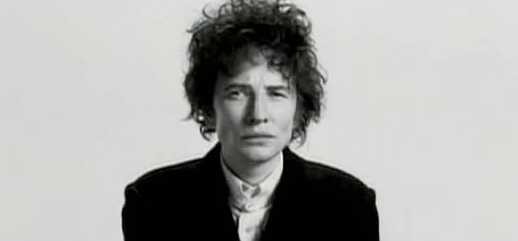 Among Haynes's "six aspects of Dylan," Blanchett's Jude is perhaps the most consistently startling. Bedecked with frizzy hair, a raspy cigarette-stained voice, a veering, teetering walk and a near-constant sneer, Blanchett's Jude is a fascinating, infuriating, freak -- a countercultural Golem conjured by a celebrity-obsessed media, a mendacious recording industry and voracious fans.
Among Haynes's "six aspects of Dylan," Blanchett's Jude is perhaps the most consistently startling. Bedecked with frizzy hair, a raspy cigarette-stained voice, a veering, teetering walk and a near-constant sneer, Blanchett's Jude is a fascinating, infuriating, freak -- a countercultural Golem conjured by a celebrity-obsessed media, a mendacious recording industry and voracious fans.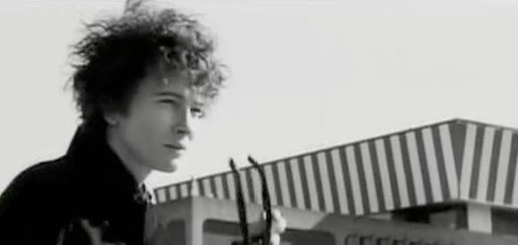 To this end, Blanchett's casting -- as the only woman to play an aspect of Dylan -- is sublime in its efficiency, allowing Blanchett's Jude to become an enthralling but mildly terrifying creature instead of simply a man on the verge of collapse. Indeed, for both Haynes and Blanchett, Jude is not so much a person as he is a "persona" in apparently human form; Jude's breakdown is not medical but mechanical, a persona malfunction as it were.
To this end, Blanchett's casting -- as the only woman to play an aspect of Dylan -- is sublime in its efficiency, allowing Blanchett's Jude to become an enthralling but mildly terrifying creature instead of simply a man on the verge of collapse. Indeed, for both Haynes and Blanchett, Jude is not so much a person as he is a "persona" in apparently human form; Jude's breakdown is not medical but mechanical, a persona malfunction as it were.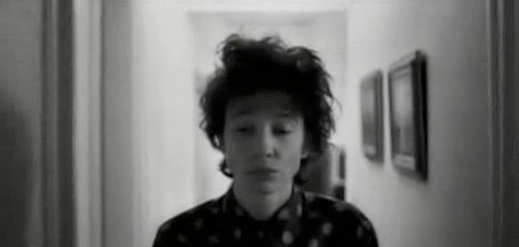 Blanchett's performance savvily operates from this often creepy contradiction (Jude appears human but he's actually a mysterious creature from planet celebrity) to mine some fascinating moments: Jude's viciously preening masculinism, his nattering self-absorption, his blithe cruelty, his casual disdain for everyone...everyone except other mysterious creatures like himself, like Allen Ginsberg (David Cross in a hilariously apt impersonation).
Blanchett's performance savvily operates from this often creepy contradiction (Jude appears human but he's actually a mysterious creature from planet celebrity) to mine some fascinating moments: Jude's viciously preening masculinism, his nattering self-absorption, his blithe cruelty, his casual disdain for everyone...everyone except other mysterious creatures like himself, like Allen Ginsberg (David Cross in a hilariously apt impersonation).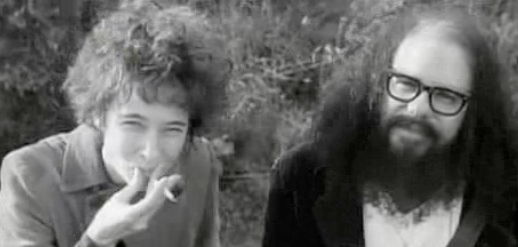 Blanchett's accomplishment in the role of Jude Quinn is extraordinary. Blanchett sculpts the persona of Jude's affect with expert precision, manipulating Jude's mask to create the illusion of life as might a master puppeteer. Blanchett opts for a reedy, sonorous vocal quality -- neither as nasal nor as breathy as one might expect -- which allows her to dip into more registers of her actual voice. Blanchett's physicality is limber, masculine in its confident looseness, even as it is coiled, a spring ready to pop. Blanchett's Jude is an expert concoction.
Blanchett's accomplishment in the role of Jude Quinn is extraordinary. Blanchett sculpts the persona of Jude's affect with expert precision, manipulating Jude's mask to create the illusion of life as might a master puppeteer. Blanchett opts for a reedy, sonorous vocal quality -- neither as nasal nor as breathy as one might expect -- which allows her to dip into more registers of her actual voice. Blanchett's physicality is limber, masculine in its confident looseness, even as it is coiled, a spring ready to pop. Blanchett's Jude is an expert concoction.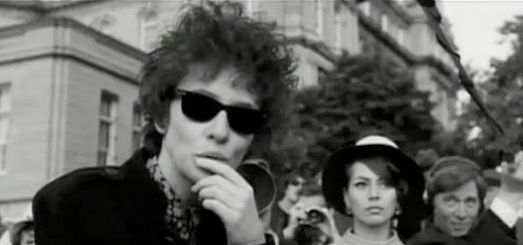 Yet Blanchett's Jude is also curiously soulless. I'm not sure if it's part of the concept to have Jude sit so beyond simple humanity (persona not person) but, unfortunately, making Jude a vacant celebrity cipher creates a tangible emotional vacuum at the center of I'm Not There.
Yet Blanchett's Jude is also curiously soulless. I'm not sure if it's part of the concept to have Jude sit so beyond simple humanity (persona not person) but, unfortunately, making Jude a vacant celebrity cipher creates a tangible emotional vacuum at the center of I'm Not There.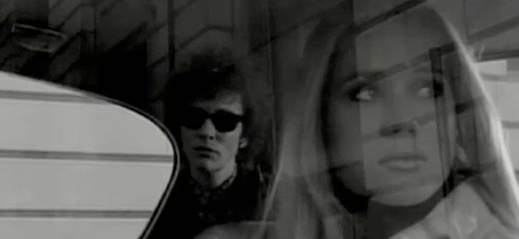 Rescreening the film in the theatre this week, I was struck by how emotionally hollow the Jude sequences were. Then, when screening Blanchett's performance online, isolated from the rest of the film (via streaming video here), I was shocked at how much my connection to Jude's thread was informed by the Bale, Gere, and Ledger threads woven around it. It's a confounding problem: I suspect what I like least about Blanchett's performance is her singular achievement of Haynes's conceit/concept.
Rescreening the film in the theatre this week, I was struck by how emotionally hollow the Jude sequences were. Then, when screening Blanchett's performance online, isolated from the rest of the film (via streaming video here), I was shocked at how much my connection to Jude's thread was informed by the Bale, Gere, and Ledger threads woven around it. It's a confounding problem: I suspect what I like least about Blanchett's performance is her singular achievement of Haynes's conceit/concept.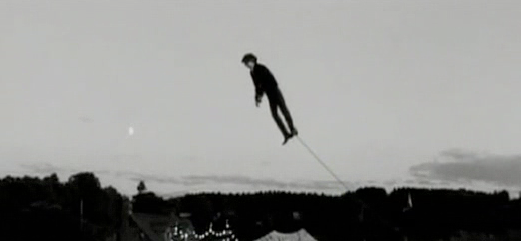 Nonetheless, I do fault Blanchett for an essential lapse. I can't help but feel that Blanchett might have provided a glimmer of soul somewhere at the center -- or even at the edges -- of Jude, to tether this artificial automaton to some kind of truth. You can almost feel Blanchett reaching for something akin to emotional integrity in her car confrontation with Keenan, or in her final monologue in the back of the car. (But, notably, those moments happen also to be the moments when Blanchett's vocal characterization is most distracting.) Something's missing from the Jude piece, something that is present with Bale, Gere and Ledger. Only in the boldest castings (Blanchett and Marcus Carl Franklin) does Haynes seem to lose hold of the abstract emotional reins of the piece.
Nonetheless, I do fault Blanchett for an essential lapse. I can't help but feel that Blanchett might have provided a glimmer of soul somewhere at the center -- or even at the edges -- of Jude, to tether this artificial automaton to some kind of truth. You can almost feel Blanchett reaching for something akin to emotional integrity in her car confrontation with Keenan, or in her final monologue in the back of the car. (But, notably, those moments happen also to be the moments when Blanchett's vocal characterization is most distracting.) Something's missing from the Jude piece, something that is present with Bale, Gere and Ledger. Only in the boldest castings (Blanchett and Marcus Carl Franklin) does Haynes seem to lose hold of the abstract emotional reins of the piece.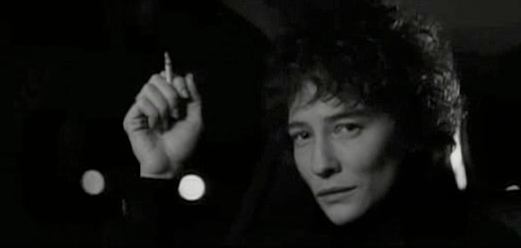 Blanchett's work as Jude is brilliant but flawed, an extraordinary yet incomplete accomplishment. And though it's hard to fault an actor for doing exactly what the director wants of them, I must nonetheless hold forth one of my articles of faith: transcendent actressing at the edges comes from providing the dimension, depth and soul that a director doesn't even know to request.
Blanchett's work as Jude is brilliant but flawed, an extraordinary yet incomplete accomplishment. And though it's hard to fault an actor for doing exactly what the director wants of them, I must nonetheless hold forth one of my articles of faith: transcendent actressing at the edges comes from providing the dimension, depth and soul that a director doesn't even know to request.

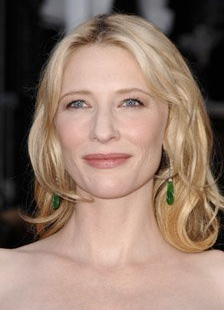
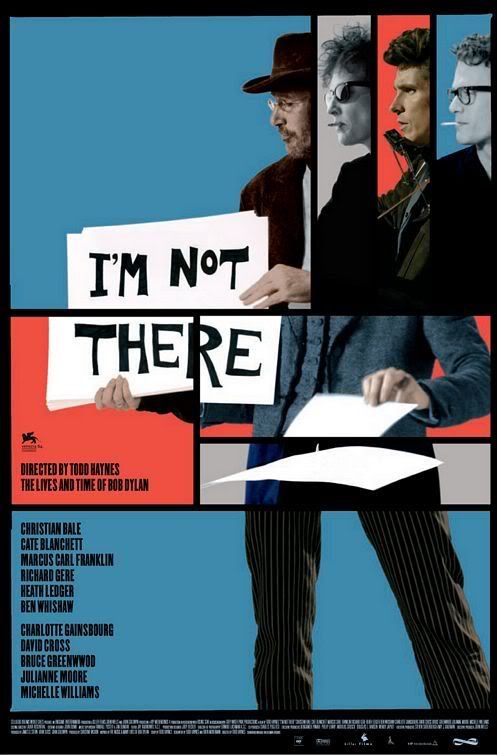
10 comments:
I really have been meaning to see this. The bits I saw on YouTube from Blanchett's segments struck me as fairly bizarre.
Thanks for doing these. Very interesting to read. Cannot wait for Tilda.
this was an interesting read. I think i like the performance a little better than you but I still think it is incomplete. The film requires all six people to give its character. in concept form it's fairly difficult to give something complete.
and that's why i prefer Gainsbourg in it I think, I'm seeing her do a full character and it feels soulful and all that.
i go back and forth though.
I don't think Cate's Dylan persona was supposed to convey emotion, just a combination of inspiration and fascination. Even sympathy is a stretch.
That's why she was also ideal for the role.
Yeah, she accomplishes that creatureness very effectively, which is clearly what Haynes wants from her. It's excellent work, no question.
But I guess what I'm struggling to figure out is why I find Blanchett's performance so off-putting. Especially (a) because I'm such a sucker for stunty stuff like cross-gender casting and (b) when I consider my fairly deep emotional reaction to the other insufferable projection screen Dylans, Bale & Ledger.
Your comment, js, also reminds me that what I liked about Blanchett in Notes on a Scandal is how she permitted empathy with Sheba while also making her fairly unsympathetic. I didn't realize then that such a turn was out of Blanchett's usual repertoire...
As much as I admire her performance it did not resonate with me. Most of the time I am unimpressed with mimicry, and other times it blows me away (Angela Bassett, Marion Cotillard). This falls some where in the middle.
Through out her scenes I kept seeing Jennifer Saunders doing a spoof.
Michael: Sadly; after reading what you just said, that's all I can think of this performance. Dammit!
Aside from that, I'm a fan of this, even though it wouldn't make it into my top five. It's definitely an accomplishment, but one of the all times? No, I don't think so.
One has to wonder if some of the critical backlash; or at least the lack of "BLANCHETT SHOULD WIN THIS! YARR" can be attributed to her 'lauded' performance in The Golden Age, rather than this one. It does seem very harsh of people to do that; not judging the performances separately.
lulu, now that you mentioned Notes on a Scandal, it is up for consideration in my own 2007-2008 awards season (was released here just after the Oscars) and I defend her from those "miscast" accusations by pointing out what I liked best from that perf: those glassy eye stares that she kept doing while having those one-sided conversations with Judi Dench. Just completely showed an idealist's vulnerability that was perfect grounds for a reality check.
michael parsons - you mentioned Jennifer Saunders as Cate Blanchett as Bob Dylan. For my part, I did Patti Lupone as Marion Cotillard as Edith Piaf. :P
JS, if she's up for your own awards i hope you buck fraudulent convention and put her in "LEAD" where she belongs
I thought Cate nailed the Dylan temperament, circa his Don't Look Back period. Watch D.A. Pennebacker's great doc and it's clear that, at least in 1965, Dylan's arrogance was equal to his genius (Joan Baez was a sweetheart, though). Not a lot of warmth for Blanchett to latch onto in her biting characterization.
Sentimental me is pulling for Dee, but if Cate wins I think it's justified. Her confidence must have understandably soared the first time she eyed herself in full costume and makeup as Dylan, and she seems to have as much fun playing the icon as she did when she pulled off that wicked take on Hepburn a few years ago. A sly sense of enjoyment is a factor missing from a lot of actor's Oscar-winning work, and it's welcome when it shows up in a role.
Yes, Blanchett and Haynes both riff on Pennebaker's Dylan in ways that are amazing. I guess where I run into problems is in Haynes's additional Fellini overlay, which aims -- it seems at times literally -- to put us inside the head of the asshole artist. That's where the missing piece of Blanchett's performance is more prominent for me...
Post a Comment